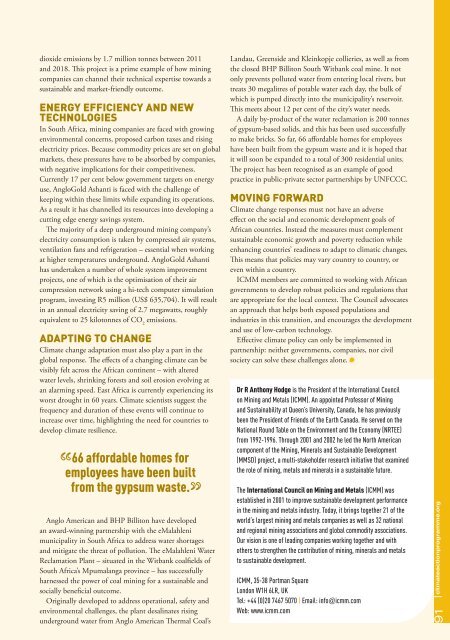Climate Action 2011-2012
You also want an ePaper? Increase the reach of your titles
YUMPU automatically turns print PDFs into web optimized ePapers that Google loves.
dioxide emissions by 1.7 million tonnes between <strong>2011</strong><br />
and 2018. This project is a prime example of how mining<br />
companies can channel their technical expertise towards a<br />
sustainable and market-friendly outcome.<br />
energy eFFiciency And new<br />
technologieS<br />
In South Africa, mining companies are faced with growing<br />
environmental concerns, proposed carbon taxes and rising<br />
electricity prices. Because commodity prices are set on global<br />
markets, these pressures have to be absorbed by companies,<br />
with negative implications for their competitiveness.<br />
Currently 17 per cent below government targets on energy<br />
use, AngloGold Ashanti is faced with the challenge of<br />
keeping within these limits while expanding its operations.<br />
As a result it has channelled its resources into developing a<br />
cutting edge energy savings system.<br />
The majority of a deep underground mining company’s<br />
electricity consumption is taken by compressed air systems,<br />
ventilation fans and refrigeration – essential when working<br />
at higher temperatures underground. AngloGold Ashanti<br />
has undertaken a number of whole system improvement<br />
projects, one of which is the optimisation of their air<br />
compression network using a hi-tech computer simulation<br />
program, investing R5 million (US$ 635,704). It will result<br />
in an annual electricity saving of 2.7 megawatts, roughly<br />
equivalent to 25 kilotonnes of CO 2<br />
emissions.<br />
AdApting to chAnge<br />
<strong>Climate</strong> change adaptation must also play a part in the<br />
global response. The effects of a changing climate can be<br />
visibly felt across the African continent – with altered<br />
water levels, shrinking forests and soil erosion evolving at<br />
an alarming speed. East Africa is currently experiencing its<br />
worst drought in 60 years. <strong>Climate</strong> scientists suggest the<br />
frequency and duration of these events will continue to<br />
increase over time, highlighting the need for countries to<br />
develop climate resilience.<br />
66 affordable homes for<br />
employees have been built<br />
from the gypsum waste.<br />
Anglo American and BHP Billiton have developed<br />
an award-winning partnership with the eMalahleni<br />
municipality in South Africa to address water shortages<br />
and mitigate the threat of pollution. The eMalahleni Water<br />
Reclamation Plant – situated in the Witbank coalfields of<br />
South Africa’s Mpumalanga province – has successfully<br />
harnessed the power of coal mining for a sustainable and<br />
socially beneficial outcome.<br />
Originally developed to address operational, safety and<br />
environmental challenges, the plant desalinates rising<br />
underground water from Anglo American Thermal Coal’s<br />
Landau, Greenside and Kleinkopje collieries, as well as from<br />
the closed BHP Billiton South Witbank coal mine. It not<br />
only prevents polluted water from entering local rivers, but<br />
treats 30 megalitres of potable water each day, the bulk of<br />
which is pumped directly into the municipality’s reservoir.<br />
This meets about 12 per cent of the city’s water needs.<br />
A daily by-product of the water reclamation is 200 tonnes<br />
of gypsum-based solids, and this has been used successfully<br />
to make bricks. So far, 66 affordable homes for employees<br />
have been built from the gypsum waste and it is hoped that<br />
it will soon be expanded to a total of 300 residential units.<br />
The project has been recognised as an example of good<br />
practice in public-private sector partnerships by UNFCCC.<br />
moving ForwArd<br />
<strong>Climate</strong> change responses must not have an adverse<br />
effect on the social and economic development goals of<br />
African countries. Instead the measures must complement<br />
sustainable economic growth and poverty reduction while<br />
enhancing countries’ readiness to adapt to climatic changes.<br />
This means that policies may vary country to country, or<br />
even within a country.<br />
ICMM members are committed to working with African<br />
governments to develop robust policies and regulations that<br />
are appropriate for the local context. The Council advocates<br />
an approach that helps both exposed populations and<br />
industries in this transition, and encourages the development<br />
and use of low-carbon technology.<br />
Effective climate policy can only be implemented in<br />
partnership: neither governments, companies, nor civil<br />
society can solve these challenges alone.<br />
Dr R Anthony Hodge is the President of the International Council<br />
on Mining and Metals (ICMM). An appointed Professor of Mining<br />
and Sustainability at Queen’s University, Canada, he has previously<br />
been the President of Friends of the Earth Canada. He served on the<br />
National Round Table on the Environment and the Economy (NRTEE)<br />
from 1992-1996. Through 2001 and 2002 he led the North American<br />
component of the Mining, Minerals and Sustainable Development<br />
(MMSD) project, a multi-stakeholder research initiative that examined<br />
the role of mining, metals and minerals in a sustainable future.<br />
The International Council on Mining and Metals (ICMM) was<br />
established in 2001 to improve sustainable development performance<br />
in the mining and metals industry. Today, it brings together 21 of the<br />
world’s largest mining and metals companies as well as 32 national<br />
and regional mining associations and global commodity associations.<br />
Our vision is one of leading companies working together and with<br />
others to strengthen the contribution of mining, minerals and metals<br />
to sustainable development.<br />
ICMM, 35-38 Portman Square<br />
London W1H 6LR, UK<br />
Tel: +44 (0)20 7467 5070 | Email: info@icmm.com<br />
Web: www.icmm.com<br />
91 climateactionprogramme.org












